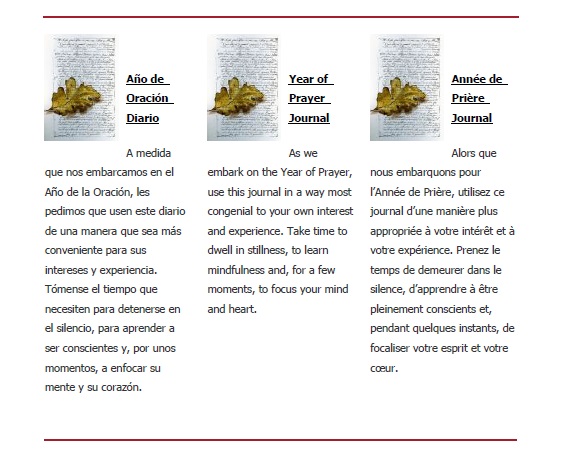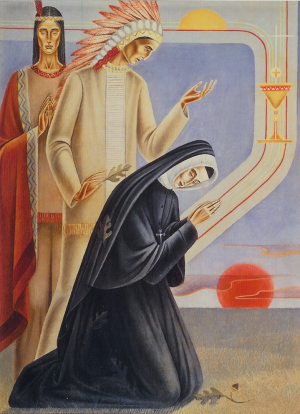Waiting on God
Waiting on God
Dear Philippine,
When I first met you I was impressed by your many qualities, which spoke deeply to my heart. Today I wish to reflect with you about your patient waiting, in faith and hope, to fulfil your dreams.
It began in 1792 when the monastery where you were a novice was confiscated and you had to return home. Then followed years of waiting before joining the Society, going to America, and finally, in 1841, to the Potawatomi, too old and sick to do anything but be “the woman who prays always.”
What message do you have for us today, Philippine? In our world of instant coffee, commmunication, gratification, even happiness, have we forgotten how to wait? To hope and pray? Have we forgotten how to follow a dream? To aim high?
What gave you the inspiration to continue knocking on the Lord’s door, believing your prayer will be granted? Was it your intense prayer life? Your love of the Eucharist? How do we learn to discern whether the Lord is saying “no” or “yes, but not yet”? To “wait for God’s time” and know when it arrives?
Only the poor know how to wait. Teach us that poverty of heart that knows it can do nothing of itself, is open to the will of the Lord and ready to wait for it to manifest itself. Teach us to have vision, to journey to new frontiers, to persevere in our dreams, wait for their fulfilment. As you did.
Author: Katie Mifsud, RSCJ, Community of Malta
Image: Milton Frenzel
Esperando a Dios
Querida Filipina:
Cuando te conocí, me quedé impresionada por tus muchas cualidades, que hablaban profundamente a mi corazón. Hoy quiero reflexionar contigo acerca de tu paciente espera, en la fe y en la esperanza, para cumplir tus sueños.
Comenzó en 1792 cuando el monasterio donde eras novicia fue confiscado y tuviste que regresar a casa. Luego siguieron años de espera antes de unirte a la Sociedad, de ir a América, y finalmente, en 1841, a los Potawatomi, demasiado anciana y enferma para hacer cualquier cosa excepto ser “la mujer que reza siempre”.
¿Qué mensaje tienes para nosotras hoy, Filipina? En nuestro mundo del café instantáneo, comunicación, gratificación, incluso la felicidad, ¿hemos olvidado cómo esperar? ¿Esperar y orar? ¿Hemos olvidado cómo seguir un sueño? ¿Cómo apuntar alto?
¿Qué te dio la inspiración para seguir llamando a la puerta del Señor, creyendo que tu oración sería concedida? ¿Fue tu intensa vida de oración? ¿Tu amor por la Eucaristía? ¿Cómo aprendemos a discernir si el Señor está diciendo “no” o “sí, pero no todavía”? ¿A “esperar el tiempo de Dios” y saber cuándo llega?
Sólo los pobres saben esperar. Enséñanos aquella pobreza de corazón que sabe que no puede hacer nada por sí misma, está abierta a la voluntad del Señor y lista para esperar que se manifieste. Enséñanos a tener visión, a viajar a nuevas fronteras, a perseverar en nuestros sueños, a esperar su cumplimiento. Tal y como lo hiciste tú.
Autora: Katie Mifsud, RSCJ, Comunidad de Malta
Imagen: Milton Frenzel
Dans l’attente de Dieu
Chère Philippine,
Lorsque je t’ai rencontrée pour la première fois, j’ai été impressionnée par tes nombreuses qualités, qui m’ont touchée au plus profond de mon cœur. J’aimerais réfléchir avec toi aujourd’hui à la patiente attente, dans la foi et l’espoir, dont tu as fait preuve pour réaliser tes rêves.
Tout a commencé en 1792, lorsque le monastère où tu étais novice a été confisqué et que tu as dû rentrer chez toi. Ont suivi des années d’attente avant d’entrer dans la Société, d’aller en Amérique et enfin, en 1841, de rejoindre les Potawatomi, trop âgée et malade pour ne rien faire d’autre qu’être « la femme qui prie toujours ».
Quel message as-tu pour nous, aujourd’hui, Philippine ? Dans notre monde où tout est instantané, comme le café, la communication, la satisfaction et même la joie, avons-nous oublié comment attendre ? Comment espérer et prier ? Avons-nous oublié comment poursuivre un rêve ? À viser toujours plus haut ?
Quelle inspiration t’a poussée à continuer à frapper à la porte de Dieu, en croyant que ta prière serait exaucée ? Était-ce ton intense vie de prière ? Ou ton amour de l’Eucharistie ? Comment apprenons-nous à discerner si le Seigneur nous dit « non » ou « oui, mais pas encore » ? À attendre le temps de Dieu et savoir quand il viendra ?
Le pauvre est le seul à savoir comment attendre. Enseigne-nous que la pauvreté du cœur qui sait qu’il ne peut rien de lui-même est ouverte à la volonté du Seigneur et prête à l’attendre pour qu’elle se manifeste. Enseigne-nous à avoir la vision, à voyager vers de nouvelles frontières, à poursuivre nos rêves et à attendre qu’ils se réalisent. Tout comme tu as su le faire.
Auteur: Katie Mifsud, RSCJ, Communauté de Malte
Image : Milton Frenzel
![]()

If you received this message from a friend and would like to receive our messages directly in the future, please sign up on our website.
Has your contact information changed recently? Update your full contact information and your mailing preferences.










